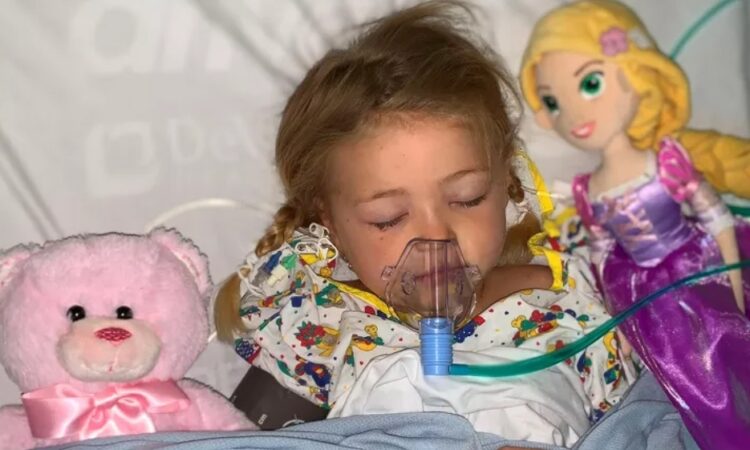4-Year-Old Girl Nearly Dies After Strep A Leads to Flesh-Eating Bacteria: ‘She Was Deteriorating’

Leanne Passey says her 4-year-old daughter Reign was hospitalized due to necrotizing fasciitis, a rare flesh-eating bacteria that can be deadly in about one-in-five patients
A 4-year-old girl was left fighting for her life after strep A turned into a case of flesh-eating bacteria.
Leanne Passey, from England, opened up about the horrifying experience, which she said began after her daughter Reign had chickenpox. The 31-year-old mother told South West News Service that a few days after her little girl contracted chickenpox, she had a temperature and extreme exhaustion, which Passey believed to be group A strep.
After noticing a red ring developing around one of Reign’s sores, Passey took Reign to the emergency room and says she was told to give her daughter an antibiotic and go home.
“By this point the red ring had almost tripled in size,” she told the outlet. “They were adamant they were too busy, she was too contagious and I needed to take her home. I said the only way I was leaving was if they kicked me out — she was deteriorating by the second.”
After reportedly being dismissed numerous times, Passey took Reign to another hospital but was forced to wait for six hours as her condition worsened.
“She’d gone past the point of screaming and was lying there, almost lifeless,” she recalled, noting that Reign’s temperature was nearly 107 degrees and she began hallucinating. “I picked her up and carried her through the doors and said, ‘Someone needs to see my daughter; I feel like she’s dying.’ “
Reign was then rushed into a four-hour surgery where doctors confirmed she had contracted necrotizing fasciitis, a rare flesh-eating bacteria that can be deadly in about one in five patients. During surgery, doctors made a large cut in her side in order to remove the bacteria and prevent it from spreading. They believe Reign’s infection was the result of her group A strep, the most common cause of necrotizing fasciitis, according to the CDC.
Following the surgery, Reign’s condition didn’t turn around and she was put in an induced coma and given breathing support while in the ICU.
“Her face and body were swollen — she didn’t look right at all,” Passey told SWNS. “We walked her to [the operating room], and the surgeon explained it had spread and she was in septicemia – we didn’t know if she was going to survive.”
Reign spent three weeks in the hospital before making a miraculous recovery, and Passey said that her daughter is doing well now. After being left with a large scar, the toddler jokes that she got it from “winning a fight against a crocodile.”
Passey admitted that she’s now sharing her family’s story because of how easy it is for common illnesses to lead to something more severe.
“It’s horrendous. You never expect it to happen to you until it does,” she said. “I just want people to understand that it’s so serious. It wasn’t the chickenpox; it was the strep that got through the wound.”
Strep A refers to the diseases that can occur after being infected with the bacteria called Group A streptococcus, including strep throat, scarlet fever, necrotizing fasciitis, rheumatic fever, impetigo, and more.
Necrotizing fasciitis — commonly known as flesh-eating disease — quickly kills the body’s soft tissue found around muscles, nerves, fat, and blood vessels and it can turn lethal in a short period of time, according to the Centers For Disease Control and Prevention. Since 2010, about 700 to 1,150 Americans are diagnosed with necrotizing fasciitis each year, though the CDC notes this may be an underestimate.
The infection can be successfully treated with antibiotics and surgery to remove infected tissue if it’s caught early, which is important to a patient’s survival. According to the agency, up to 1 in 5 people with necrotizing fasciitis die from the infection.
However, chances of contracting necrotizing fasciitis are rare, especially if you’re healthy and have a strong immune system, the CDC says.
Parents are urged to seek medical attention immediately if they suspect their child has an invasive group A strep infection. It is also recommended that children stay up to date with flu and chickenpox vaccines because the illnesses can increase the risk for invasive group A strep infections.




